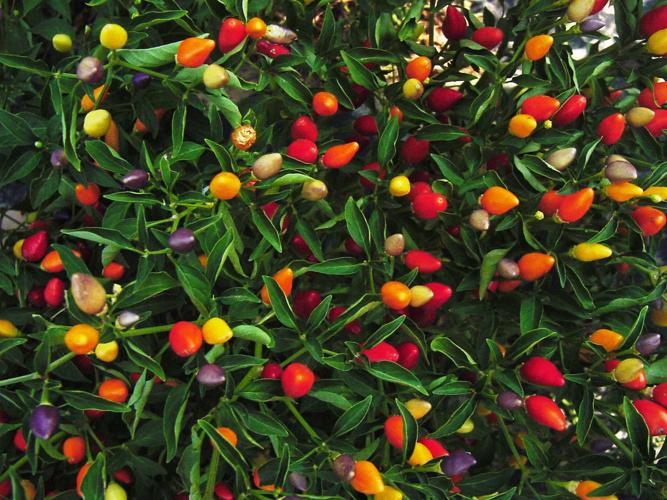Would you like a plant in your garden that makes everyone ask what is it and where can they get one? Two ornamental peppers have been named Texas Superstars and they will be a wow factor in your landscape, one for the flashy foliage and the other for the showy multicolored peppers.
Purple Flash ornamental pepper, Capsicum annuum “Purple Flash,” has dark leaves that look almost black with splashes of white and purple. The peppers start out black and turn a fiery red as they mature. The foliage is the standout, though, and the peppers, while pretty, are less noticeable and secondary to the leaves.
In Texas, Purple Flash can be planted in the spring to early summer as long as it is watered regularly until established. It prefers full sun but can tolerate partial shade. It also is tolerant of a wide variety of soils and potting mixes as long as they are well drained. It is fairly drought tolerant. With a little care, it should last through Texas hot summers and into the fall.
NuMex Twilight ornamental pepper, Capsicum frutescens “NuMex Twilight,” is a showstopping plant that produces edible hot peppers. The peppers grow upright and begin purple, changing to yellow, orange and then red as they mature. This colorful rainbow really stands out against the green stems and leaves. Even though these peppers are edible, don’t let the fun colors fool you. These peppers have the same heat element as a cayenne or Tabasco pepper, which is 4 to 20 times hotter than a jalapeno. Flowers and peppers produce continually through the summer until first frost. Planting and plant care is the same as Purple Flash; although NuMex Twilight may not be as drought tolerant.
Ornamental peppers look great in mass plantings, either in flower or vegetable beds. They also can be a fun pop of surprise in containers because of the unique foliage and peppers on these Texas Superstars.
The Smith County Master Gardener program is a volunteer organization in connection with the Texas A&M AgriLife Extension Service.





